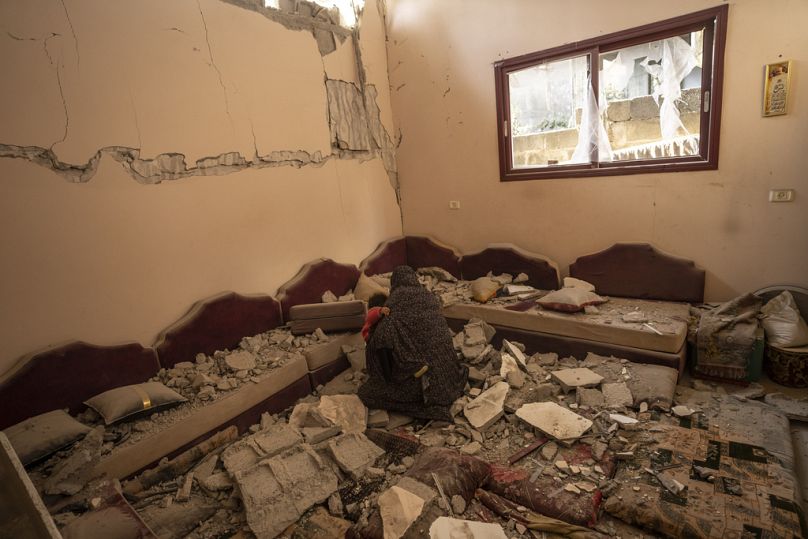The latest developments from the Israel Hamas war.
Israeli jet hits Lebanon
Israel has struck a number of targets in southern Lebanon, following rocket attacks by Hezbollah earlier on Saturday.
 ADVERTISEMENT
ADVERTISEMENT
 ADVERTISEMENT
ADVERTISEMENT
The Israeli Defence Force shared footage of several strikes on X, hitting a mix of buildings and rural sites.
It said a "terrorist squad, launch site, military buildings and terrorist infrastructure" were targeted.
They said Israeli jets had hit Hezbollah targets in Aita al-Sha’ab, Yaron and Ramya.
Hezbollah fires rockets at Israel
Lebanon’s Hezbollah fired dozens of rockets at northern Israel on Saturday, raising the spectre of regional conflict.
The Shiite militant and political group warned the barrage was its "initial response" to the suspected Israeli strike on a top Hamas leader in Beirut earlier this week.
Hezbollah chief Sayyed Hassan Nasrallah vowed to retaliate for the killing of Saleh Arouri, the deputy political leader of Hamas, saying that doing nothing would make Lebanon vulnerable to Israeli attack.
Nasrallah appeared to be making the case for a response to the Lebanese public, even at the risk of escalating the fighting between Hezbollah and Israel. However, he did not indicate how or when the militants would act.
Hezbollah said Saturday that it launched 62 rockets toward an Israeli air surveillance base on Mount Meron and it scored direct hits.
Israel's military said about 40 rockets were fired towards Meron, but made no mention of a base. It said it struck the cell that fired the rockets.
Hezbollah is a key ally of Hamas in Gaza and has supported the Palestinian militant group in its war with Israel.
Hezbollah has exchanged first with Israeli forces on an almost daily basis since fighting began on 7 October.
UN warns Gaza is 'uninhabitable'
The United Nations humanitarian chief has described Gaza as “uninhabitable” three months into Israel's war with Hamas, warning that famine was looming and a public health disaster unfolding.
Assessing the devastating impact of Israel’s military response to the horrific Hamas attacks on 7 October, Martin Griffiths said that Gaza's 2.3 million people face “daily threats to their very existence."
He pointed out that tens of thousands of people, mostly women and children, have been killed or injured, families are sleeping in the open as temperatures plummet and areas where Palestinians were told to relocate have been bombed.
“People are facing the highest levels of food insecurity ever recorded (and) famine is around the corner,” Griffiths said.
The few partially functioning hospitals are overwhelmed and critically short of supplies, medical facilities are under relentless attack, infectious diseases are spreading and, amidst the chaos, some 180 Palestinian women are giving birth every day.
“Gaza has simply become uninhabitable,” the UN undersecretary-general for humanitarian affairs said.
He said the humanitarian community is facing an “impossible mission” – trying to help more than two million people, while UN staff and aid workers from partner organisations are killed, communications blackouts continue, roads are damaged, truck convoys are shot at and vital commercial supplies “are almost non-existent”.
Griffiths' message comes as UNICEF warn that cases of diarrhoea among children under 5 have risen from 48,000 to 71,000 in Gaza - an indication of poor nutrition.
Only 2,000 cases of diarrhoea are usually reported each month in the Gaza Strip.
Palestinians seeking refuge in southern Gaza say every day has become a struggle to find also food, water, medicine and working bathrooms.
Only a trickle of humanitarian aid has entered the Palestinian territory since Hamas’ deadly attack on southern Israel ignited the war.
Fewer than 200 aid trucks enter each day, less than half the prewar level - and aid groups say the fighting hinders distribution.











